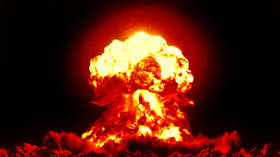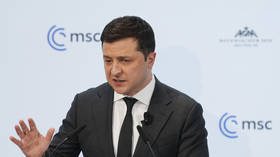Ukraine’s nuclear threats undermine European security, experts tell RT

President Volodymyr Zelensky’s hints that Ukraine might review its non-nuclear status “seriously undermine European and international security,” a senior researcher at the Center for European Studies at Primakov National Research Institute of World Economy and International Relations, Vladimir Olenchenko, told RT on Sunday.
The day before, in his speech at the Munich security conference, Zelensky said that his country might reverse its decision to give up its nuclear weapons if it doesn't get security guarantees from the major world powers. According to Olenchenko, this statement was made in line with the latest trend of Kiev’s policy to revise “various kinds of international agreements in which Ukraine participates.”
By this revision, in the expert’s opinion, the Ukrainian authorities are trying to obtain some “unilateral benefits” and “the benefits which harm European security.”
“What does it mean - to return to the status of a nuclear state? This is a question related to nuclear proliferation. Ukraine is also a signatory to the Nuclear Non-Proliferation Treaty. So next time it will say that it wants to leave it too? There are lots of such irresponsible statements which go far beyond their [Ukrainian authorities’] responsibility,” Olenchenko said.
According to a professor at the Institute of European Studies in Belgrade, Dr Stevan Gajic, Zelensky’s threat shows that the president has become “a hostage of Ukrainian political culture.”
Arguing that the president’s rhetoric has dramatically changed since his election campaign, the expert said that obtaining nuclear weapons is “virtually impossible” for Ukraine as this process takes a very long time and requires huge resources.
Nevertheless, Gajic, like Olenchenko, thinks that Zelensky’s statement is unhelpful in itself and might be poised to “provoke a preemptive attack from Russia.”
“I don’t see a way that Russia will tolerate a nuclear program on its borders. Actually, the whole point of the crisis today is that Russia’s concerns about the NATO enlargement and about the rockets being closer and closer to the Russian borders are not met. So how is this going to help?” he said to RT.
The professor also warned that despite the unrealistic nature of the atomic weapons threat, Ukraine is quite capable of creating a so-called ‘dirty weapon’, which could “make some serious damage to Europe.”
“So hopefully the West, that is politically supporting Ukraine today, would try to reason with the Ukrainian leadership not to make such really irresponsible things,” he added.
Over the last few days the situation in eastern Ukraine has significantly deteriorated. The authorities of the self-declared breakaway republics in Donetsk and Lugansk ordered an evacuation of civilians ahead of an anticipated “breakthrough” by the Ukrainian forces. Kiev categorically denies all claims about such plans, blaming Russia for creating a pretext for its own invasion into Ukraine. Moscow rejects these allegations.
On Sunday, Russian and French presidents Vladimir Putin and Emmanuel Macron agreed to urgently take diplomatic measures to halt the escalation. Zelensky, according to the French president’s office, “confirmed his determination not to react to provocations and to respect the ceasefire.”













